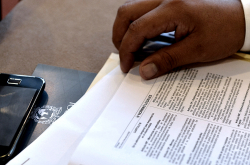INTERPOL expresses its deepest sympathy and sorrow over the loss of life and suffering in connection with the conflict in Ukraine.
Neutrality is fundamental to INTERPOL’s work and existence, even, indeed especially, when member countries are engaged in conflict. It is a position that INTERPOL has maintained consistently.
INTERPOL is a global technical police cooperation organization, which enables its 195 member countries to exchange information on crime and criminals.
Article 2 of INTERPOL’s Constitution calls on the Organization to maintain police cooperation and ensure communication channels remain open. INTERPOL’s mandate does not include issuing sanctions or taking punitive measures, nor is there any provision in the Constitution for the suspension or exclusion of a member country.
It is strictly forbidden for the Organization to undertake any intervention or activities of a political, military, religious or racial character.
Global law enforcement cooperation
INTERPOL is committed to continuing to serve global law enforcement requests for cooperation, whilst ensuring that communication through its network is compliant with its Constitution and Rules.
This is why since the beginning of the conflict, and further to the decision by the National Central Bureau (NCB) in Ukraine to disconnect from the INTERPOL network thereby removing its ability to monitor messages, the General Secretariat immediately took steps to protect data processing via its channels.
To prevent any potential misuse of INTERPOL’s channels in relation to the targeting of individuals within or beyond the conflict in Ukraine, heightened supervision and monitoring measures in relation to Russia have now been implemented by the Secretary General, a decision which was endorsed by the Executive Committee.
Effective immediately, diffusions can no longer be sent directly by NCB Moscow to member countries. NCB Moscow must now send all diffusions to the General Secretariat to be checked for compliance with INTERPOL’s Rules. Only if a diffusion is found compliant will the General Secretariat then disseminate it to member countries. This procedure is in addition to the General Secretariat’s current process of reviewing all Notice requests for compliance.
Additional measures may be taken on an urgent basis by the Secretary General if the need arises.
INTERPOL’s rules state that each member country maintains full control over the information they decide to share with other countries via INTERPOL. This includes the restriction of access to its data.
Similarly, a decision by a member country whether to act on a request via INTERPOL, is exclusively at the discretion of the competent national authorities.
Preventing gaps in global security
Preventing any member country from sharing vital policing information would provide criminals with clear opportunities to both commit crimes and evade capture, creating a gap in global security and safety.
Calls at the political level have been made to suspend or exclude Russia from the INTERPOL network.
In parallel, law enforcement leaders from around the world have also requested continued cooperation with Russia via INTERPOL, highlighting serious security and safety concerns if information sharing is stopped.
In addition to the tragic loss of life, conflicts invariably lead to an increase in crime, with organized crime groups looking to exploit the desperation of individuals seeking safety, with an increased risk of abuse and trafficking, in addition to weapons smuggling and trafficking in illicit goods and medicines.
Checks against INTERPOL’s databases at control points along the Ukrainian border have already resulted in the identification of individuals wanted by four different countries for a range of offences.
Global databases
Every minute, nearly 9,000 checks are made against INTERPOL’s global databases and more than 30 messages are exchanged between police worldwide using its secure global police communications system.
So far in 2022, nearly 60,000 checks have been made by member countries against data supplied by Russia.
INTERPOL was created to ensure the widest possible law enforcement cooperation, including between countries where diplomatic relations do not exist.
As long as the INTERPOL network can assist in the rescue of one child abuse victim, the prevention of one terrorist attack or the identification of one missing person, it is its duty to ensure that lines of communication remain open.
The General Secretariat will continue to uphold the four main principles of its Constitution in the execution of its mandate: National sovereignty; Respect for Human Rights; Neutrality; and Constant and active cooperation.
More information about INTERPOL’s system of Notices and Diffusions is available here





